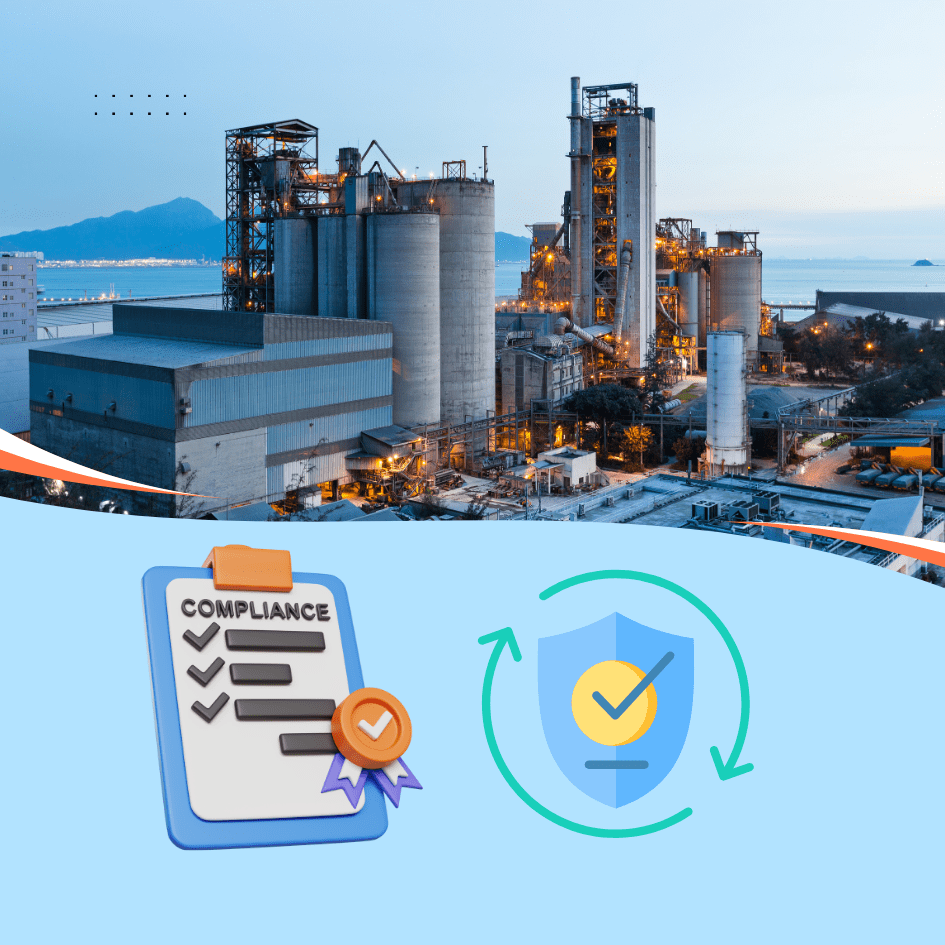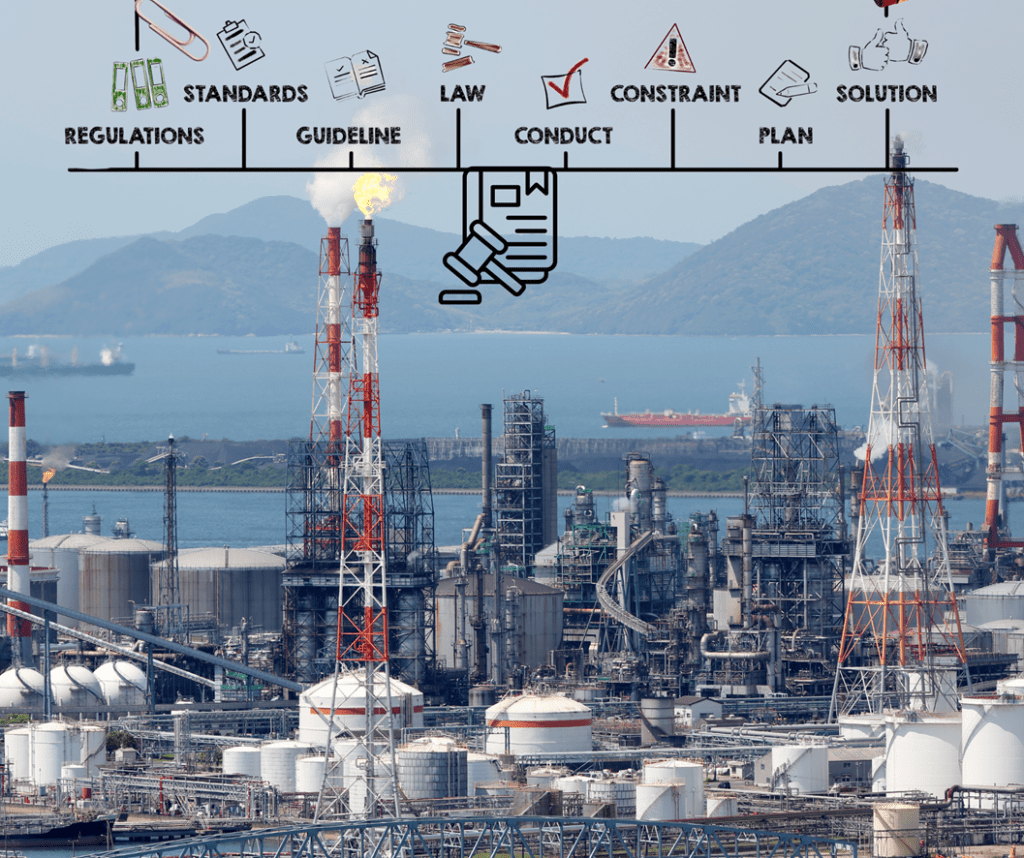FACTORY LICENSING SERVICES
Labour Laws Compliance Simplified, once you join our team.
Why Do You Need Factory Licencing Services?
Efficient Processes
Industrial Licencing Services offer a solution by assisting businesses in efficiently managing the labour laws compliance. By providing guidance on documentation, submission procedures, and timelines, these services ensure that businesses can operate smoothly without any interruptions or unnecessary delays.
Reputation Management
Obtaining licences or permits from regulatory authorities not only ensures legal compliance but also enhances a business’s reputation and credibility in the market. Industrial Licencing Services are essential in helping firms project a great image by proving that they follow all applicable labour laws and guidelines.
Labour laws Compliance with Regulations
Industrial Licencing Services play a crucial role in ensuring businesses adhere to regulatory requirements for safety, health, and other aspects of their industrial operations. By helping businesses meet all necessary standards and guidelines, these services enable them to obtain multiple labour licences and operate within the bounds of the law.
Risk Management
Businesses rely on Industrial Licencing Services to ensure labour laws compliance with regulations pertaining to safety, health, and various other aspects of their industrial operations. These services are instrumental in guiding businesses through the complex regulatory processes, minimizing delays in obtaining labour licences or permits. By providing expert advice on compliance monitoring, they also help mitigate the risks associated with accidents.
Objective of Factory Licensing Service
In India, industries falling under specific categories must adhere to regulations and restrictions before commencing operations.
- The Industrial Development and Regulation Act (IDRA), 1951 governs the issuance of industrial licences in India.
- Licences are approved by the Secretariat of Industrial Assistance (SIA) on the basis of the licensing committee’s recommendations.
- Industries in India that are subject to industrial licensing include those related to public health, safety, and national security.
- The process of obtaining an industrial licence in India involves multiple levels of authorities including panchayat, corporate, municipal, state, and national bodies.
- Securing an industrial licence in India can be a challenging, intricate, expensive, and demanding endeavour.

Who Needs Factory Licencing Services?
We are Factory Licence Consultants, based in Delhi NCR, have established connections with Industrial Licencing Services and government authorities at various levels. We assist businesses in obtaining or renewing licences efficiently. Our services cover over 75 licences under different industrial legislations in India.
Industrial Licensing Services are often necessary for companies operating in industries governed by licensing regulations. Companies in India falling under compulsory licensing categories are obligated to follow a variety of regulatory standards and obtain permits or licences from government bodies before starting or expanding their operations. Industrial Licensing Services are essential in helping businesses understand and comply with intricate licensing rules and regulations, ultimately saving time and resources.
We provide industrial licensing services to help entrepreneurs, firms, and companies acquire the necessary licences, certifications, and permissions needed to operate their industries. To obtain the necessary licenses, permissions, NOCs, and other documents, our staff communicates with the appropriate department on behalf of our clients.
The Key Elements of Obtaining Factory licence

Factory/Industrial policy of India:
The industrial policy of India has evolved significantly since independence, reflecting changes in economic priorities and global economic conditions. Here’s an overview of the major industrial policies and their key features:

Recent Trends and Policies:
Make in India Scheme (2014)
Launched with the aim of turning India into a prominent manufacturing destination on the global stage. Focuses on enhancing the business environment, promoting local production, and drawing in overseas investments.
Startup India Scheme (2016)
Focus on promoting entrepreneurship and innovation, providing funding support, and creating a conducive environment for start-ups.
Atmanirbhar Bharat Initiative (2020)
Aimed at making India self-reliant in key sectors, promoting local manufacturing, and reducing dependency on imports. Emphasis on building resilient supply chains and boosting indigenous industries.
Production Linked Incentive Scheme (2021)
Incentivizes companies to boost domestic production in key sectors like electronics, pharmaceuticals, and automotive components.
Factory/Industrial Licensing in India: Norms and Policy:

Following the liberalisation and deregulation of the Indian economy in 1991, the majority of industries are no longer required to acquire an industrial licence in order to commence manufacturing operations in India. The government now focuses its attention on industries that have the potential to impact public health, safety, and national security.
- Industrial licences in India are governed by the IDRA, 1951 Act, and are sanctioned by the Secretariat of Industrial Assistance (SIA) based on the recommendations of the licensing committee.
- Under the provisions of the Act, a licenced industrial entity is prohibited from producing a new product unless the existing licence has been renewed or a new licence has been obtained to cover the new product.
- Certain industries in India are mandated to obtain industrial licensing for manufacturing, such as those falling under compulsory licensing and industrial undertakings subject to location restrictions.
- Additionally, the requirement for licensing extends to the expansion of current industrial units.

Key Elements of Current Industrial Policy:
- Liberalization: Continued efforts to reduce regulatory burdens and enhance the ease of doing business.
- FDI Encouragement: Relaxed FDI norms in various sectors to attract foreign investment.
- Public-Private Partnership (PPP): Promoting PPP models for infrastructure development and industrial growth.
- Digitalization: Emphasis on digital infrastructure and Industry 4.0 to modernize manufacturing processes.
- Skill Development: Programs to improve workers’ abilities to fulfil the needs of contemporary industries are known as skill development initiatives.
- Sustainability: Encouragement of sustainable and green manufacturing practices.
Industrial Licensing and Registration Services
Verify that businesses are following all applicable Indian labour laws, including those pertaining to the environment, industry, panchayat NOCs, trade licences, signage permits, FSSAI compliance, legal meteorology certifications, and other legal requirements.
Acquire the necessary industrial licences for new enterprises and satisfy all legal requirements at the local, state, federal, and panchayat levels of government. We provide best solution for below-
Effortless Application Process
Easily apply for licences and approvals.
Instantaneous Updates
Stay informed about application statuses with real-time notifications.
Convenient Cloud Access
Securely manage and access data based on user and location permissions.
Coverage in Delhi NCR
Efficiently handle applications from small to large businesses, regardless of volume.
Streamlined licence Management
Automate industrial and procedural licensing, application handling, amendments.
Interactive Control Panel
Keep track of licence status and generate comprehensive reports.
Automated Monitoring
Online application tracker with personalized administrative and user privileges.
Permit or Licence Renewal
Receive timely reminders for permit renewals.
Get timely notifications for permit renewals.

Location restrictions for Factory/industries in India:
- Industries situated within a 25-kilometer radius of cities with a population of at least one million are required to obtain an industrial licence from the federal government, as per this provision.
- However, there are exceptions to this location restriction. Industries involved in the production of electronics, computer software, printing, or any other industry categorized as a ‘non-polluting industry’ are exempted. Additionally, industries situated in areas designated as ‘industrial areas’ prior to July 25, 1991, are also exempted.
- The placement of industrial units must comply with local zoning regulations, land use regulations, and environmental regulations to ensure ecological discipline is maintained.
Industries subject to compulsory licensing in India:
Due to safety, security, and environmental concerns, several sectors need mandatory licensing. Businesses planning to establish industries to produce any of the following items in India must obtain a compulsory licence:

The manufacturing of alcohol for domestic consumption is exempt from the Act’s provisions under the Industries (Development and Regulation) Amendment Act of 2016. The federal government is in charge of regulating alcohol production, while the states are in charge of domestic consumption. This division of authority was established by the Supreme Court in a 1997 decision.
The Department for Promotion of Industry and Internal Trade (DPIIT) has announced that Press Note 17 (1984 series) is no longer applicable and has been revoked due to the government of India no longer issuing licences in such cases.
The DPIIT is responsible for licensing defence aircraft, warships, body armour, and specialised military training equipment. In May 2017, the DPIIT was authorised to handle and grant licences for the production of defence goods, a responsibility that was previously held by the Ministry of Home Affairs.
Industrial/Factory licence registration:

The Department for Promotion of Industry and Internal Trade G2B Portal, established by the DPIIT, serves as a centralised platform for obtaining clearances from various government bodies and agencies. This portal streamlines access to government to business (G2B) services, including the online submission of Industrial Entrepreneurs Memorandum (IEM) and Industrial licence (IL) applications. The portal is equipped with authentication mechanisms to ensure the secure submission of IEM and IL applications.
Applications for registration were formerly sent to the Secretariat of Industrial Assistance (SIA) of the Department of Industrial Policy & Promotion (DIPP), along with the necessary fee.
Industrial entities that obtain the licence are then qualified to receive allocations of controlled commodities and licences to import goods that are essential to their establishment and operation.
Industrial/Factory licensing in India: Check policy, mandatory licences, documents, eligibility:
For some industries in India, industrial licensing is required by the Industries (Development and Regulation) Act of 1951. This act specifies which industries must apply for industrial licences before they can produce specific goods. Companies must apply online for an industrial licence via the G2B portal in order to comply with this requirement.
These businesses cannot function lawfully without this licence. On the G2B portal, the online application process is hosted by the Department for Promotion of Industry and Internal Trade (DPIIT).

IDR Act for Factory licensing:
An industrial licence must be obtained by businesses operating in specific industries, like defence, in order for them to be recognised as legal entities in India. This regulation was put into place by the Industrial Development and Regulation (IDR) Act.
The act has provided a comprehensive list of products within each industry that necessitate licensing. Consequently, companies engaged in the manufacturing of these specific products are required to possess an industrial licence.
Factory Licencing and Compliance FAQs:-
How to apply for an industrial licence?
The G2B Portal now makes it convenient to submit industrial licence applications under the IDR Act, 1951. All manufacturing firms engaged in producing the aforementioned goods must register on the G2B portal before submitting an application for an industrial licence. You will be able to access the portal after registering successfully and receiving a special login ID and password. After logging in, go to the “Services” menu and choose “Industrial Licensing service.” The ‘Apply’ button will take you to an application form where you need to fill in the required information.
The following documents are necessary for the application:
- Board resolution certificate
- Business proof
- Foreign Direct Investment
- Certificate of Incorporation
- Memorandum of Association/Article of Association
- Document detailing the production process for manufacturing items
For Example:-
- About the company
- Existing activities of the company
- Any foreign investment
- Details of investment
What is industrial licensing?
Industrial licensing refers to the regulatory process required for businesses to obtain official authorization before starting or operating industrial activities. Key aspects include:
- Regulatory Approval: Obtaining licenses from relevant government authorities to legally operate an industry. This ensures compliance with local, state, and national regulations.
- Business Compliance: Meeting specific criteria related to safety, environmental impact, and operational standards set by regulatory bodies.
- Documentation: Submitting necessary documents, such as business plans, environmental clearances, and safety audits, to acquire and maintain licenses.
- Operational Permits(License for construction work): Securing permits related to land use, construction business license, and operation, which may vary based on the type of industry and its location.
- Renewal and Audits: Regularly renewing licenses and undergoing compliance audits to ensure ongoing adherence to legal and regulatory standards.
Industrial licensing is essential for businesses to ensure they operate within the legal framework, adhere to industry standards, and avoid penalties, contributing to a structured and compliant industrial environment.
What is industrial licensing policy?
Industrial licensing policy in India is a regulatory framework designed to manage and control industrial activities within the country. Key aspects include:
- Licensing Requirements: Certain industries require a license from the government to operate. This policy ensures that businesses comply with safety, environmental, and economic standards before commencing operations.
- Industrial Licensing Act: Governed by the Industries (Development and Regulation) Act, 1951, the policy outlines which industries need licenses and the procedures for obtaining them.
- Automatic Approval: For many industries, the licensing process has been streamlined to facilitate automatic approval for new projects, especially in non-reserved sectors.
- Reserved Categories: Some sectors are reserved for the public sector or require special permission, ensuring strategic and essential industries remain under government control.
- Compliance and Monitoring: Regular audits and compliance checks are conducted to ensure adherence to licensing conditions, environmental regulations, and safety standards.
- Ease of Doing Business: The policy aims to simplify the licensing process, reduce bureaucratic hurdles, and promote investment in industrial development.
The industrial licensing policy in India is crucial for regulating industrial growth, ensuring sustainable development, and maintaining compliance with legal and environmental standards. Also we provide commercial contractor license.
How to get small scale industry license?
Getting a small scale industry (SSI) license in India involves several key steps to ensure compliance with regulations and eligibility requirements. Here’s a streamlined process:
- Determine Eligibility:
- Ensure your business meets the criteria for a small scale industry as defined by the Ministry of Micro, Small and Medium Enterprises (MSME), which includes investment limits and operational scale.
- Obtain Udyam Registration:
- Register your business under the Udyam Registration portal (formerly MSME Registration) to obtain a Udyam Registration Number. This registration is crucial for availing benefits and incentives for small-scale industries.
- Prepare Required Documents:
- Business Proof: Incorporation certificate or partnership deed.
- Identity Proof: Aadhar card, PAN card of the proprietor or partners.
- Address Proof: Utility bills or property documents.
- Bank Details: A bank statement or passbook.
- Financial Statements: Balance sheet, profit & loss account.
- Apply for the License:
- Visit the Udyam Registration portal (udyamregistration.gov.in).
- Fill out the registration labour licence form with details about your business.
- Upload the necessary documents.
- Submit the labour licence form for verification.
- Approval and Certificate:
- Upon successful submission, your application will be reviewed. You will receive an Udyam Registration Certificate, which serves as your SSI license.
- Compliance with Additional Regulations:
- Depending on your industry, additional licenses or permits might be required from local authorities, such as factory licenses, environmental clearances, or health and safety approvals.
- Renewal and Updates:
- Keep your registration updated with any changes in business details and ensure timely renewal if applicable.
By following these steps, you can successfully obtain and maintain a small scale industry license, ensuring your business operates within the legal framework and benefits from government schemes and incentives.
What is factory act 1948?
The Factories Act 1948 is a significant legislation in India designed to regulate working conditions, safety, and health standards in factories. Key aspects include:
- Worker Safety: Establishes safety measures and machinery standards to prevent accidents and injuries.
- Health Provisions: Mandates cleanliness, ventilation, and medical facilities within factories.
- Working Hours: Regulates working hours, overtime, and rest periods to ensure fair labor practices.
- Employment Regulations: Sets guidelines for the employment of women and children, including restrictions on working hours and conditions.
The Factories Act 1948 ensures a safer and healthier work environment, promoting worker welfare and compliance with labour standards.
What is the Industrial Disputes Act, 1951?
The Industrial Disputes Act, 1951 is a key legislation in India aimed at regulating the resolution of industrial disputes between employers and employees. It provides a framework for the investigation and settlement of disputes to promote industrial harmony and protect workers’ rights. Here are the main features and components of the Act, highlighted with high search volume keywords.
- Objective
- The primary objective of the Act is to secure industrial peace and promote cooperation between employers and employees. It aims to prevent and resolve conflicts in industries, ensuring a stable working environment.
- Definitions
- The Act defines terms such as “industrial dispute,” “workman,” and “employer,” providing clarity on the parties involved in disputes.
- Dispute Resolution Mechanism
- The Act establishes mechanisms for resolving disputes through negotiation, conciliation, and adjudication.
- It mandates the establishment of Industrial Tribunals and Labour Courts for the settlement of disputes.
- Strike and Lockout Provisions
- The Act regulates the conditions under which workers can strike and employers can lock out, ensuring that both parties follow due process.
- It specifies notice periods and procedures to be followed before initiating strikes or lockouts.
- Rights of Workmen
- The Act safeguards the rights of workmen, including their right to join trade unions and participate in collective bargaining.
- It protects against unfair dismissal and ensures workers are treated fairly.
- Implementation
- The Act is enforced by various authorities, including the Ministry of Labour and Employment, which oversees compliance and resolves disputes.
- Amendments
- Over the years, the Act has been amended to address changing industrial relations dynamics and enhance worker protections.
- The Industrial Disputes Act, 1951, plays a crucial role in maintaining industrial peace and ensuring fair treatment for workers in India. Understanding this Act is essential for employers, employees, and HR professionals to navigate industrial relations effectively.
How long does it take to obtain a factory license?
The timeline varies depending on the location and complexity of the application, but it typically takes 2-6 weeks, provided all documents are in order.
Are there penalties for operating without a factory license?
Yes, operating without a valid license can result in fines, legal actions, or even the closure of the factory.
Are there state-specific requirements for factory licensing?
Yes, licensing requirements may vary by state, as each state government can implement specific rules under the Factory Act, 1948. It’s important to consult the local regulations.
What is the renewal process for a factory license?
Factory licenses are usually renewed annually. The renewal involves submitting an application with updated documents and paying the applicable fees to the local licensing authority.
Do small-scale industries need a factory license?
Small-scale industries may require factory licenses if they meet certain criteria, such as workforce size or the use of power machinery. Other registrations, like MSME certification, might also be necessary.
What happens if there are changes in factory operations?
If there are changes in operations, such as expansion, alterations in manufacturing processes, or location changes, the factory license must be updated to reflect these changes.
Who needs an industrial or factory license?
Businesses engaged in manufacturing, processing, or production activities that employ workers and meet specific thresholds for power usage and manpower require a factory license.
What documents are typically needed for a factory license?
Commonly required documents include:
- Proof of ownership or lease agreement of the factory premises
- Layout plan and building approval
- NOC from the Pollution Control Board
- Details of manufacturing processes
- Certificates for fire and safety compliance
- Employee details
What other approvals might be required alongside a factory license?
Additional approvals may include:
- Environmental Clearance
- Fire Department NOC
- Electrical Installation Approval
- Pollution Control Board Consent
- Labor Department Registration
Contact Us Today
Office Address: Plot No. 1984, LGF, Sec-45, Gurgaon, 122003, Haryana, India
Email: marketing@sankhlaco.com, info@sankhlaconsultants.com
Contact: +91 7809900200, +124-4211707, 4266706
Linkedin page– Sankkla Consultants
